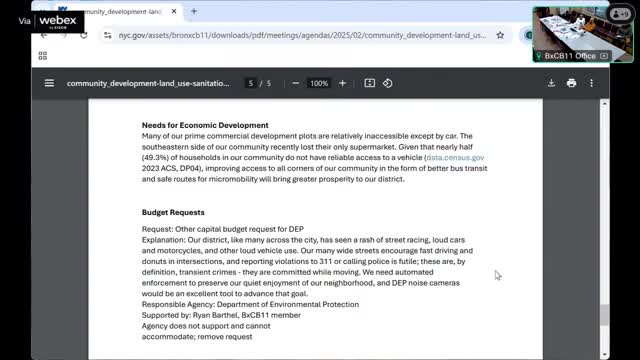Board members flag supermarket quality, high prices and poor transit as barriers to local commerce
Get AI-powered insights, summaries, and transcripts
Subscribe
Summary
Committee members said limited transit access, poor supermarket quality and high local food prices reduce shopping options, push residents to shop outside the district and discourage diverse retailers; members debated whether attracting bigger chains (e.g., Trader Joe’s) would help or harm small businesses.
Community Board 11 members and residents said poor transit access and limited supermarket competition are harming local economic development and food access, and they discussed whether bringing national chains would improve affordability.
Speakers described neighborhoods with limited grocery choices and higher prices. One member said an olive oil bottle priced at roughly $55 in a local store illustrated how high food costs make healthy options unaffordable for many residents.
Members connected transit gaps to retail pricing: when stores are accessible mainly by car and parking is scarce, people double park or drive short distances, which affects shopping patterns. Several speakers argued that bringing more diverse grocery options could help, but others cautioned that national chains can displace small stores and change neighborhood character.
The committee discussed strategies to attract different retailers: more development (which could increase foot traffic), better transit links to neighboring commercial corridors, and targeted economic-development outreach to recruit grocers. Members also raised quality-of-life issues tied to limited choice — higher prices, fewer fresh options and the perception that local stores do not meet neighborhood needs.
Ending: The committee recommended collecting more data on retail gaps and transit access as input to a neighborhood study and to potential budget or planning requests.
